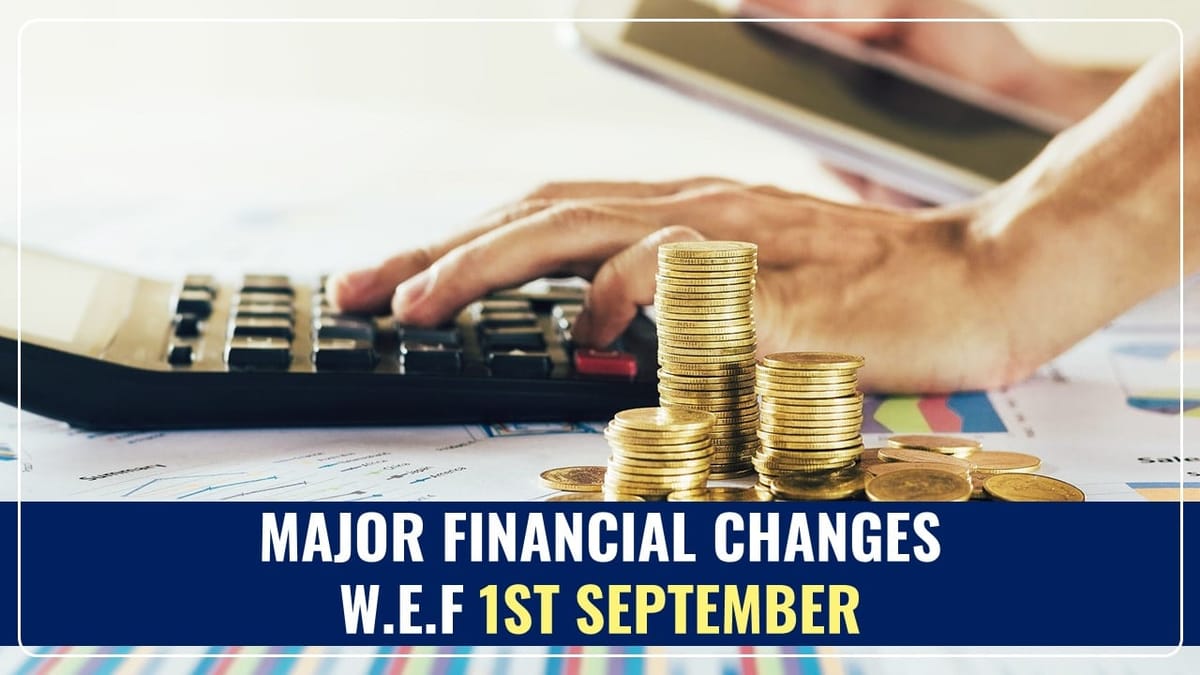Several personal finance-related changes are set to take effect in September, which, if not managed carefully, could have an adverse effect on your wallet.
Reetu | Sep 2, 2024 |

Major Financial Changes in September that can Impact your Wallet; Know Here
Several personal finance-related changes are set to take effect in September on the banking and financial services fronts, which, if not managed carefully, could have an adverse effect on your wallet.
These changes range from selecting your own debit/credit card network to lowering rewards points on specific credit card transactions to lowering minimum due payments on credit cards that will merely increase the interest load on your purchase, and paying Rs 50 for Aadhaar updates, among others. Many banks will be terminating their special deposit schemes this month, so now is the time to lock in your money for better rates.
Most banks’ special fixed deposit (FD) schemes provide attractive interest rates just until September. High credit demand and poor deposit mobilisation have worried the lenders since they result in asset-liability mismatches. Since last December, some banks have issued special FDs with enticing interest rates. However, the majority of these schemes are coming to an end this month.
For example, SBI’s special FD scheme gives 7.10% for 400 days until September 30, while IDBI Bank’s special scheme offers 7.35% for 700 days. Large lenders such as State Bank of India, HDFC Bank, Bank of Baroda, and Union Bank of India offered special FD programs in June and July with interest rates ranging from 7.10 to 7.35%.
The Unique Identification Authority of India (UIDAI) has announced that free Aadhaar card updates will expire on September 14. However, the free service is still only available on the myAadhaar portal, and updating through Aadhaar centres still charges Rs.50. Starting September 15, even updating through the myAadhaar portal would be charged at Rs.50.
Starting September 6, banks must allow clients to choose their card network when applying for or renewing a card. And the cheapest are Rupay cards developed by the National Payments Corporation of India (NPCI), rather than the globally accepted and dominating Visa and Mastercard, which have transaction fees that are more than three times that of Rupay cards.
While these American card networks charge around Rs.2 for every transaction from the issuing bank, NCPI charges roughly 40 paise. The issuer transfers the cost to the cardholder in the form of merchant discount rates (MDR), merchant fees, and interchange fees, among others.
This means that if a bank issues a Mastercard, the consumer can choose a Visa card instead, and vice versa. Existing customers will also be able to make this decision when their current card is due for renewal.
One pleasant surprise is that Rupay cardholders will be able to receive the same reward points for UPI purchases as they do for POS/online transactions. According to the NPCI, this will provide a greater benefit to credit consumers. And, this is because, in early August, the NPCI agreed to the rewards imbalance affecting Rupay credit card users, stating that, unlike traditional card transactions, UPI payments made with Rupay cards until now did not offer similar reward points, which are the primary drivers of card usage.
Beginning September 1, HDFC Bank’s reward points for utilities and telecom transactions will be limited to 2,000 points per month. Furthermore, education fees paid using third-party apps such as Cred and Mobikwik are not eligible for rewards points. However, educational payments made directly through the college/school’s website or PoS machines will continue to collect awards.
Customers of IDFC First Bank credit cards should likewise exercise caution, as the small lender’s credit card payment terms have changed as of this month. The changes include adjustments to payment due dates and minimum amounts payable. The payment due date has been reduced from 18 days to 15 days from the date the statement was generated. Missing the due date on a credit card results in not just a nonpayment penalty, but also compound interest. So make sure you pay your credit card bills on time.
If you are salaried and have extra sources of income such as interest from deposits, rental income, capital gains from markets or other applicable investments, the deadline for paying the second instalment of the advance tax is September 15. Section 234A of the Income Tax Act penalizes late tax payments with 12% interest or 1% each month.
In case of any Doubt regarding Membership you can mail us at [email protected]
Join Studycafe's WhatsApp Group or Telegram Channel for Latest Updates on Government Job, Sarkari Naukri, Private Jobs, Income Tax, GST, Companies Act, Judgements and CA, CS, ICWA, and MUCH MORE!"